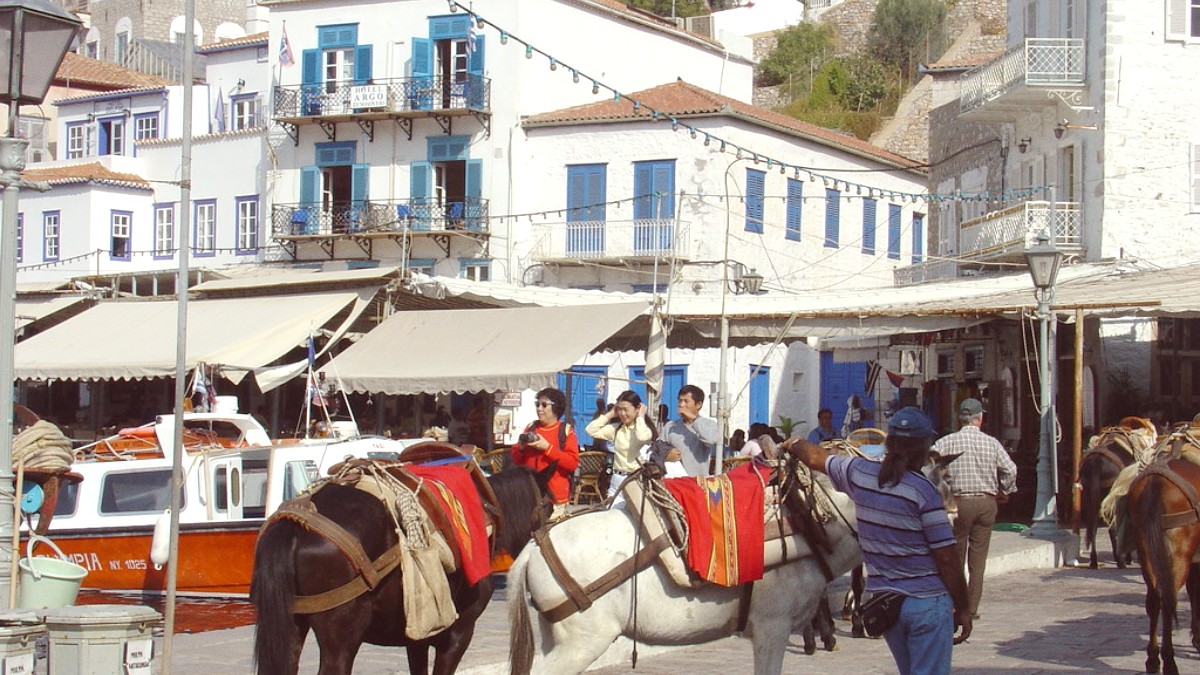
Saronic Gulf Islands, Greece
Discover fresh fish and seafood, like octopus, squid, and shrimp. Olive oil, lemon, oregano, thyme, and garlic widely season dishes.
Tomatoes feature prominently, specifically in summer. Local cheeses, including feta and graviera, frequently appear.
Typically a light meal: coffee and a pastry. Many port cafes present more substantial breakfast choices.
Lunch occurs mid-afternoon, usually 2:00 PM to 3:00 PM. It varies from a full, unhurried meal to a lighter snack, contingent on your itinerary.
The day's main meal, enjoyed late evening, from 8:00 PM onward. This frequently becomes a social gathering, lasting multiple hours.
Local catch, grilled simply with olive oil, lemon, oregano.
Available at most waterfront tavernas, where you might pick your fish from a display.
Grilled octopus (Oktapodi skaras) stands as a specialty. Often sun-dried before grilling.
Seek it at seafood tavernas.
Skewered, grilled meat (typically pork or chicken).
Frequently served in pita bread with tzatziki, fresh tomato, and onion. Accessible at casual eateries and souvlaki shops.
Hard, dry bread, often forming the base for salads (dakos) or dips.
Loukoumades: fried dough balls, resembling donuts, topped with honey and cinnamon. Baklava: thin phyllo layers filled with chopped nuts, sweetened with fragrant syrup.
Though not numerous, Hydra features a few upscale restaurants, many with prime sea views.
Many tavernas and restaurants line the waterfront and Hydra Town's charming alleys.
Small gyros shops and bakeries suit affordable, quick meals.
Many Greek dishes are naturally vegetarian: horiatiki salata, gigantes plaki, briam, and fava.
Vegan options demand thoughtful selection, though awareness is increasing. Often, you may ask for dishes sans meat or dairy.
Growing awareness of gluten-free and other allergens in Greece makes clear communication of needs important.
For severe allergies, a Translation card detailing your allergy in Greek can be quite useful. Prioritize naturally gluten-free foods such as grilled fish, salads, and rice dishes.
Dedicated cooking classes or structured food tours are not broadly available on Hydra.
Farm visits or direct interaction with food producers on the island are few, as rocky terrain restricts large-scale agriculture.
Local festivals sometimes showcase traditional foods and culinary demonstrations.
International cuisine choices are few; most establishments concentrate on Greek dishes.
Greeks savor unhurried meals; expect a calm tempo during your dining experience.
This atmosphere especially suits evening dining, often extending for multiple hours.
Ordering several meze (small plates) for sharing is customary. This method promotes tasting diverse flavors.
It's a wonderful way to sample more of the local cuisine.
International cuisine choices are few on Hydra; most establishments concentrate on Greek and Mediterranean dishes.
Hydra features a small daily fresh produce market near the port, for purchasing fruits, vegetables, and at times fresh fish.
This annual event, the most significant on Hydra, celebrates Admiral Andreas Miaoulis.
An annual cultural event that welcomes puppet theater groups from worldwide to the island.
This initiative displays contemporary art exhibitions in various island venues, drawing artists and art admirers.
These quieter coastal villages also feature tavernas, often serving simpler, homemade Greek fare.
A chance for a peaceful meal away from the main port's bustle.
Mandraki features a popular beach club with a restaurant. A convenient spot for a meal after a day by the sea.
Dining choices are fewer compared to Hydra Town but ideal for beachgoers.
Prioritize restaurants that highlight local ingredients, supporting island producers.
Choose seafood that is responsibly sourced, if information is available, to support healthy marine ecosystems.
Be mindful of waste; consider dining in to reduce single-use plastics.
International cuisine choices are few on Hydra; most establishments concentrate on Greek and Mediterranean dishes.